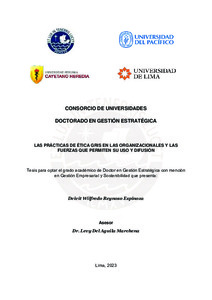| dc.contributor.advisor | Del Aguila Marchena, Levy | |
| dc.contributor.author | Reynoso Espinoza, Deivit Wilfredo | |
| dc.date.accessioned | 2023-11-08T21:13:10Z | |
| dc.date.available | 2023-11-08T21:13:10Z | |
| dc.date.created | 2023 | |
| dc.date.issued | 2023-11-08 | |
| dc.identifier.uri | http://hdl.handle.net/20.500.12404/26380 | |
| dc.description.abstract | En esta tesis se desarrolla y prueba un modelo teórico sobre el fenómeno de
las prácticas de ética gris y las fuerzas que impulsan su uso y difusión en las
organizaciones empresariales. Las prácticas de ética gris se definieron como las
usadas por organizaciones para favorecerlas, aunque vistas desde una perspectiva
amplia sobrepasan los límites éticos sociales. La investigación utilizó el método mixto
paralelo convergente. Los participantes de la sección cualitativa fueron 15 expertos
en gestión de empresa y temas de ética, y en la sección cuantitativa fueron 714
trabajadores de empresas peruanas. Los resultados indican que la legitimación, la
banalización y la normalización, planteadas en esta investigación, son fuerzas que
influyen en el uso y difusión de las prácticas de ética gris. La legitimación impulsa el
uso y difusión de esas prácticas porque origina la apariencia de tener respaldo
administrativo, generar membresía al grupo y estar vinculo tradicionalmente a este.
La banalización se muestra como una fuerza que las respalda porque estas prácticas
generan menos daños que otras, son necesarias o sus consecuencias tienen poca
relevancia. La normalización se muestra como la fuerza que genera su inclusión en
los aprendizajes sociales, su racionalización e instauración en las rutinas
organizacionales. Se concluye que la banalización es la fuerza de mayor impacto.
Las fuerzas investigadas influyen sesgando de forma activa las elecciones
individuales, pero generan la apariencia externa de que fueron tomadas con libertad.
Esta investigación representa un avance teórico y empírico del fenómeno de la ética
gris en las organizaciones. | es_ES |
| dc.description.abstract | In this thesis, a theoretical model is developed and tested on the phenomenon
of gray ethical practices and the forces that drive their use and diffusion in business
organizations. Gray ethical practices were defined as those used by organizations to
favor them, although seen from a broad perspective they exceed social ethical limits.
The research used the convergent parallel mixed method. The participants in the
qualitative section were 15 experts in business management and ethics issues, and in
the quantitative section there were 714 workers from Peruvian companies. The results
indicate that legitimization, banalization, and normalization, raised in this research, are
forces that influence the use and diffusion of gray ethics practices. Legitimation
promotes the use and dissemination of these practices because it creates the
appearance of having administrative support, generating group membership, and
being traditionally linked to it. The banalization is shown as a force that supports them
because these practices generate less damage than others, are necessary or their
consequences have little relevance. Normalization is shown as the force that
generates its inclusion in social learning, its rationalization and establishment in
organizational routines. It is concluded that banalization is the force with the greatest
impact. The investigated forces influence by actively biasing individual choices but
generate the external appearance that they were made freely. This research
represents a theoretical and empirical advance of the phenomenon of gray ethics in
organizations. | es_ES |
| dc.language.iso | spa | es_ES |
| dc.publisher | Pontificia Universidad Católica del Perú | es_ES |
| dc.rights | info:eu-repo/semantics/openAccess | es_ES |
| dc.rights.uri | http://creativecommons.org/licenses/by/2.5/pe/ | * |
| dc.subject | Ética | es_ES |
| dc.subject | Empresas--Administración | es_ES |
| dc.title | Las prácticas de ética gris en las organizacionales y las fuerzas que permiten su uso y difusión | es_ES |
| dc.type | info:eu-repo/semantics/doctoralThesis | es_ES |
| thesis.degree.name | Doctor en Gestión Estratégica con mención en Gestión Empresarial y Sostenibilidad | es_ES |
| thesis.degree.level | Doctorado | es_ES |
| thesis.degree.grantor | Pontificia Universidad Católica del Perú. Escuela de Posgrado | es_ES |
| thesis.degree.discipline | Gestión Estratégica con mención en Gestión Empresarial y Sostenibilidad | es_ES |
| renati.advisor.dni | 07874791 | |
| renati.advisor.orcid | https://orcid.org/0000-0003-0140-7235 | es_ES |
| renati.author.dni | 70016801 | |
| renati.discipline | 419078 | es_ES |
| renati.juror | Pasco Dalla Porta, Mario Marcello | es_ES |
| renati.juror | Quiroz Velasco, Maria Teresa | es_ES |
| renati.juror | Del Águila Marchena, Levy | es_ES |
| renati.juror | Ferreira Moura Junior, James | es_ES |
| renati.juror | Calderón Hernández, Gregorio | es_ES |
| renati.level | https://purl.org/pe-repo/renati/level#doctor | es_ES |
| renati.type | https://purl.org/pe-repo/renati/type#tesis | es_ES |
| dc.publisher.country | PE | es_ES |
| dc.subject.ocde | https://purl.org/pe-repo/ocde/ford#5.02.04 | es_ES |







